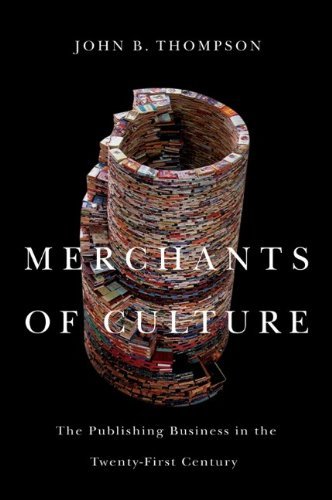by Steve Laube
 Merchants of Culture: The Publishing Business in the Twenty-First Century by John B. Thompson (published by Polity) is this month’s “Book of the Month.”
Merchants of Culture: The Publishing Business in the Twenty-First Century by John B. Thompson (published by Polity) is this month’s “Book of the Month.”
I took this 432 page book with me on vacation and was mesmerized by its detailed analysis of the history of publishing and bookselling. Thompson’s chapter on “The Rise of Literary Agents” was, of course, particularly interesting.
I have been a student of this industry for 30 years and thoroughly enjoy understanding its nuances. (It just dawned on me that this means I’ve read nearly 1,500 issues of “Publisher’s Weekly!”) In my opinion, this is the one book you should read if you want an overview of everything that goes into the publishing business. Did you know that the practice of allowing booksellers to return stock for full credit did not start in the U.S. until the early 30s? It was used during the Great Depression as a way to stimulate sales and to encourage booksellers to carry more inventory without risk. Eighty years later that practice still plagues the industry (see my post “Many Happy Returns“).
Another chapter discusses the rise of corporate ownership and how that has affected acquisition strategies. Throughout I appreciated Thompson’s global perspective. The author is a professor of sociology at the University of Cambridge and so he bring a British view to the discussion, not one based solely on U.S. situations.
There is a sixty page chapter on “The Digital Revolution” which is great foundational reading but is handicapped by the speed at which that aspect of the industry is changing. If I had to say one critical thing about the book it would be that this chapter felt a bit like reading yesterday’s news. (Even though the book was published less than a year ago!) It is terribly ironic that the book is not available in e-book form. Something I hope the publisher will fix eventually.
Every author, editor, publisher, sales, and marketing person should all spend time with this book. When you understand history you are less likely to repeat mistakes. I cannot recommend it more highly. As far as our industry is concerned it could well be my book-of-the-year.
There is one problem with reading a book like this on vacation…I didn’t feel like I was on vacation. It immersed me back into my world of work. So, as a promise to my family, I put it down during the second week of vacation (and read Unbroken – Hillenbrand, The Left Hand of God – Hoffman, and Capitol Games – Haig, instead). But I picked it up again later with great pleasure.







